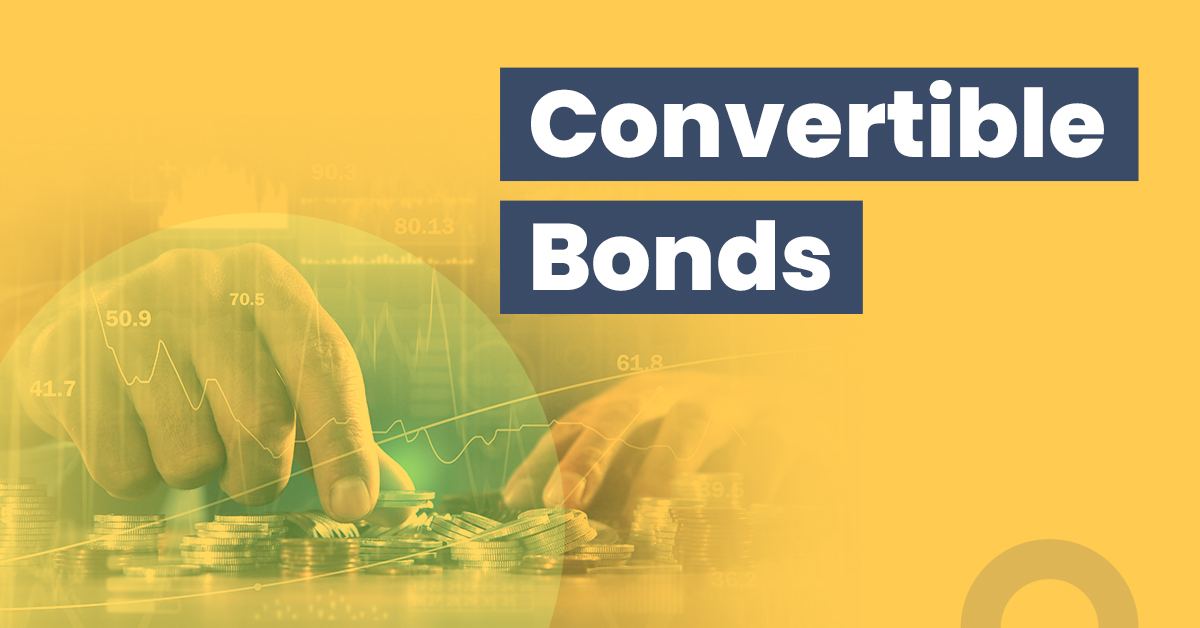Convertible Bonds: Meaning, Types, List, Benefits & Examples


Any company in need of funds may issue bonds to raise money from the public. This bond is simply a form of loan taken from the people. A convertible bond is one such type of bond issued by corporations to raise funds. It is a hybrid debt product that aims to provide a balance between debt and equity. With this context, let’s explore the topic in more detail.
In this article, you’re going to know the meaning of convertible bonds, their types, benefits, examples, etc.
What are Convertible Bonds?
Generally, when dealing in financial markets, you come across two broad types of securities – equity and debt (fixed income). A convertible bond is a hybrid corporate debt security. It offers fixed interest payments, but you can convert it into a predetermined number of equity shares or common stock. You can avail the option to convert bond securities to stocks at a specific time during the bond tenure.
The value and the quantum of shares are determined at the time of the issue. After the conversion, you become the shareholder of the company. Convertible bond is a hybrid investment product, so the price is influenced by changing interest rates, the cost of the company’s stock, and the credit rating of the issuing company.
Convertible bonds provide a flexible fundraising option for companies. Investing in such a bond aims to give you the best of both worlds, i.e., the features and safety of a bond while keeping the stock ownership option open. The per share price at which you can convert your bond into common equity shares or conversion price is determined when the issuer decides the conversion ratio for the bond.
In terms of features, convertible bonds are similar to regular corporate bonds with fixed investment periods and interest payouts. You receive its face value at maturity if you don’t convert the bond into equity during the tenure. Additionally, such bonds have a lower rate of interest than regular corporate bonds due to the option of switching them into equity shares.
Example of a Convertible Bond
Let’s take a convertible bond example. Suppose a company, ABC Ltd, issues a convertible bond at face value of Rs 1,000, a five-year maturity period, and an interest rate of 5%. The conversion ratio offered is 25:1. Thus, the effective conversion price will be Rs 1,000 divided by 25, which equals Rs 40 per share.
After investing in the bond for three years, you will receive total interest payments of Rs 150 (Rs 50 for each year). At the time, the share price of ABC Ltd has appreciated and is trading at Rs 60 per share. You can then choose to convert the bond and get 25 shares priced at Rs 60 – the total value will be Rs 1,500. This way, the convertible bond offers you a fixed income and the opportunity to participate in the company’s growth.
You must also note that during the same time, the stock price of ABC Ltd may also fall and the returns may become negative.
Also Read: Stock Market Timings in India: Opening & Closing Times for NSE & BSE
Types of Convertible Bonds in India
In India, there are different types of convertible bonds on offer. Here’s a brief overview of the same:
Regular Convertible Bonds
These bonds come with a fixed date of maturity and a predetermined conversion price. Moreover, the company issuing the bond will pay regular interest until maturity. After maturity, you may convert the bond into shares at the predetermined price or redeem it at face value. It is essential to understand that in such cases, conversion is not an obligation but a right you can exercise at your discretion.
Mandatory Convertible Bonds
As the name suggests, it is compulsory to convert these bonds into equity shares at maturity. It pays out regular interest during the bond tenure, just like any other debt security. The issuing company may offer a higher interest rate on such bonds as it is mandatory to convert them into equity at a predetermined price.
Reverse Convertible Bonds
For this type of bond, the issuing company has the right to convert it into equity at the set price after maturity. However, the company may choose to retain the bond as such or convert the bond into equity depending on the ongoing economic situation and the stock price.
Features of Convertible Bonds
As mentioned earlier, these bonds have features similar to non convertible bonds, with some distinctions. Let us have a look at them:
Coupon Payment
As you know, these bonds are debt instruments, and thus they are more secure. The coupon payments offered by the bonds depend on the market’s interest rates. Additionally, the issuing company’s credit rating also influences the coupon rate.
Conversion Ratio
The conversion ratio of the bond defines how many shares you can own after converting one bond. For instance, if the conversion ratio is 5:1, it means that after conversion, you will own five shares in the issuing company. The issuing company sets the conversion ratio, but it does not influence the value of the bond. The ratio, however, influences the conversion price of the bond.
Conversion Price
The conversion price is the actual price at which the share will be allotted to you by the issuing company. It can be obtained by dividing the market price of bonds by conversion ratio.
Also Read: Bonus Shares: Meaning, Types, Advantages & Limitations
Advantages of Investing in Convertible Bonds
Convertible bonds offer significant advantages to both investors and the issuing company. Let us have a quick overview:
For Investors
Investing in convertible bonds offers you dual benefits. The first is that you receive fixed income through interest payouts until maturity. The second is the option of converting the bond into equity shares and benefiting from the company growth. In addition, convertible bonds have a lower risk of credit default.
For the issuing company
The most significant advantage for the companies issuing convertible bonds is that it allows them to raise funds quickly without diluting the shareholding at that point. Company can retain a higher part of earnings as it has to pay fixed interest payments. This retained earnings can be reinvested in the company. Additionally, when investors buy these convertible bonds, they become part of the company’s growth. Thus, the company can decide to offer a slightly lower rate of interest on these bonds as compared to regular corporate bonds.
Also Read: Equity Shares: Meaning, Features, Types & Benefits
Disadvantages of Investing in Convertible Bonds
Like any other investment, few factors may discourage you from investing in these types of securities. Take a look at some of these factors:
- As you may opt to convert the bond into equity shares, the issuing company may offer an interest rate lower than common or non convertible bonds.
- In turbulent market conditions, converting bonds into equity shares may dilute the share price, creating a negative sentiment among the original shareholders. This might trigger an additional fall in the share price.
When is the Right Time to Convert?
The right time to convert convertible bonds is typically when the company’s stock price is high, meaning the value of the shares you would receive from converting is greater than the value of holding onto the bond and continuing to receive interest payments. In simple terms, you would convert when doing so gives you more value in shares than keeping the bond. Additionally, considering market conditions, the company’s performance and potential future stock price growth can help make a well-informed decision.
Conclusion
For investors looking to enjoy the best of both worlds – the security of a debt instrument and growth opportunities related to equity – convertible bonds can be a great investment tool. The bonds can offer good diversification to your portfolio with a possibility of significant income in favourable market conditions.
FAQs
Who can issue convertible bonds?
Listed businesses with equity can issue convertible bonds. However, not all such companies issue convertible bonds. Convertible bonds are typically issued by companies that have high expectations for growth and less-than-stellar credit ratings.
Can you lose money on convertible bonds?
Generally, convertible bonds have a higher potential for appreciation than regular bonds. However, they are also vulnerable to losses if the issuing company defaults in payment or fails to pay interest and principal on time.
What is the purpose of convertible bonds?
You can convert these bonds to avail common equity in the issuing company. Companies issue such bonds to lower the coupon rate and delay share dilution.
How often do convertible bonds pay interest?
Typically, such bonds pay interest every six months.
Are convertible bonds a good investment?
Investing in convertible bonds can be attractive as it provides the opportunity to generate significant returns due to the potential growth in the stock value of the issuing company. At the same time, the investment offers the security of fixed income until it is converted.
What are non-convertible bonds?
Non-convertible bonds are fixed-income securities that pay a regular interest rate and return the principal at maturity but cannot be converted into equity shares of the issuing company.







